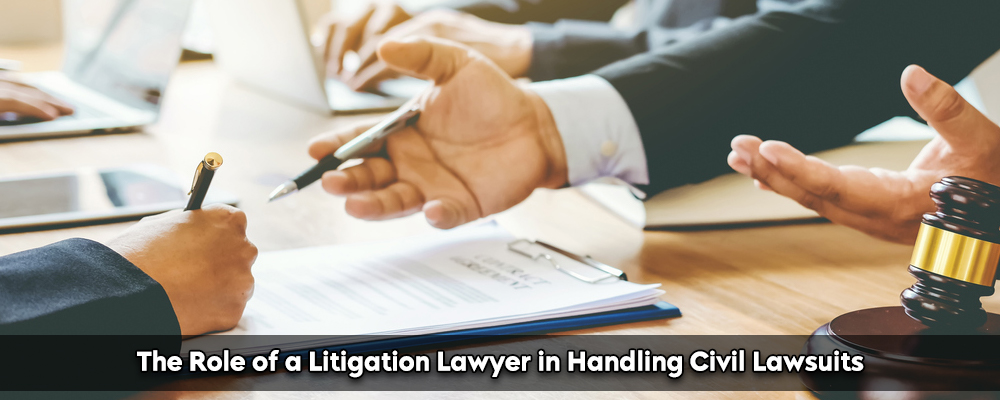In the complicated legal environment of today, civil lawsuits are frequently used to settle disagreements. These legal proceedings deal with a wide range of topics, including family law concerns, commercial disputes, and personal injury claims. The assistance of a litigation attorney is crucial when people or organizations become involved in such disputes.
What is a Civil Litigation?
Any legal disagreement between two or more parties that seeks monetary compensation or a particular remedy (such as an injunction) as opposed to criminal punishment is known as civil litigation. Civil litigation seeks to end disputes and make up for harm done to people or things as a result of another party’s conduct or negligence.
Need A Legal Advice
The internet is not a lawyer and neither are you. Talk to a real lawyer about your legal issue

Functions of a Litigation Lawyer
- Before proceeding, litigators carefully evaluate the strength of their client’s case. To evaluate the chances of victory, they examine the available evidence, perform legal research, and examine relevant statutes. This assessment aids customers in making well-informed choices about whether to file a lawsuit.
- A litigation attorney creates a thorough legal plan as soon as they start on a case. This plan includes the actions they will take to accomplish the client’s objectives, including settlement negotiations, litigation, and the investigation of non-traditional conflict resolution options like mediation or arbitration.
- Litigation attorneys conduct in-depth legal studies to develop a compelling argument. To bolster their client’s argument, they look at laws, rules, precedents, and case law. This study is crucial for developing strong arguments and foreseeing counterarguments.
- Pleadings are the legal documents that must be written and filed in order to file a lawsuit or respond to one. Complaints, responses, counterclaims, and motions are among these papers. The basic framework for litigation is established by the pleadings, which lay out the case’s legal and factual foundation.
- Both sides gather evidence during the essential discovery phase of civil litigation to back up their assertions or defenses. Lawyers involved in legal disputes use a variety of discovery techniques. Additionally, they evaluate the veracity of potential witnesses and evidence.
- Before going to trial, litigators frequently negotiate a settlement with the other side’s attorneys. Gaining good results and avoiding the time and cost associated with a trial require effective negotiation skills.
- Pre-trial motions are filed by litigators to resolve any potential legal difficulties before a trial. These motions may aim to end the lawsuit, restrict the trial’s subject matter, or settle certain legal difficulties.
- Litigation attorneys meticulously prepare for trials by choosing witnesses, formulating trial strategies, and crafting strong arguments. Additionally, they manage every aspect of courtroom procedures, including the presentation of evidence, cross-examination of witnesses, and legal argumentation.
- Litigation attorneys represent their clients in court by presenting evidence, examining witnesses, and making legal arguments in front of the judge or jury. Their objective is to obtain a favourable decision by presenting their client’s case in a convincing manner.
- Litigation attorneys may pursue post-trial measures, such as appeals if a trial’s verdict is unsatisfactory. They keep advocating for their clients throughout the appeals process in an effort to have the decision reversed or amended.
Why is it required to Hire a Litigation Lawyer?
- Civil litigation can entail complex legal issues that call for expert understanding. Litigation attorneys have the legal knowledge necessary to successfully handle difficult situations.
- There are several legal documents, processes, and timeframes involved in civil litigation. A litigation attorney makes sure that all conditions are satisfied and that documents are timely and properly submitted.
- Having an experienced litigator on your side can considerably improve your negotiating edge and raise the chances of a successful outcome if you are engaged in settlement negotiations.
Hiring the services of an experienced litigation lawyer can be the difference between a speedy settlement and a drawn-out court case when it comes to civil disputes. In addition to their legal knowledge, these experts have the commitment and tenacity needed to successfully negotiate the complexity of civil litigation and secure the best results for their clients.
One can talk to lawyer from Lead India for any kind of legal support. In India, free legal advice online can be obtained at Lead India. Along with receiving free legal advice online, one can also ask questions to the experts online free through Lead India.





 Talk to a Lawyer
Talk to a Lawyer